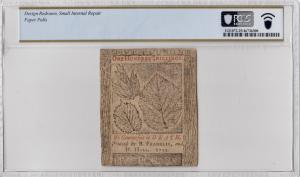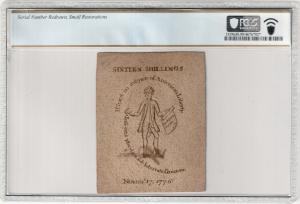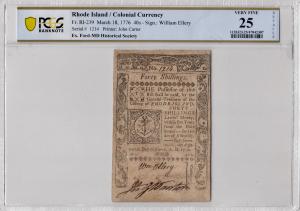Colonial-Era Money Printed By Franklin and Revere In Auction

This June 21, 1759-dated £5 denomination note printed by Benjamin Franklin and David Hall carries the warning, “To Counterfeit is DEATH.” It is one of the Colonial-era notes that will be offered by Kagin’s Auctions.
Early American banknotes from the original 13 colonies will be offered in May and September by Kagin’s Auctions
“These important notes were previously in the collection of John J. Ford, a prominent New York City collector and influential dealer who passed away at the age of 81 in 2005. Some of the notes are unique with no other examples known, and many others are the finest surviving 18th-century notes of their kind,” explained Dr. Donald Kagin, president of the auction company.
Notes from all 13 original colonies and Georgia are represented in the auctions, including a dozen notes produced by Franklin and 34 made by Revere.
Writer, inventor, and statesman Benjamin Franklin printed money for Delaware, New Jersey, and Pennsylvania. Those notes’ designs include the words, “Printed by B. Franklin,” or, “Printed by B. Franklin and D. Hall.” David Hall emigrated to Philadelphia from Scotland and was an early American printer, publisher, and business partner with Franklin.
Boston silversmith, engraver, and patriot Paul Revere printed money for Massachusetts and New Hampshire without placing his name or initials on the money.
One of the notes has the authorization signature of a signer of the Declaration of Independence, William Ellery of Rhode Island.
“John J. Ford began assembling his collection of early American money in the 1940s. There are 375 of Ford’s Colonial and Revolutionary War era notes that will be offered in the two auctions, and 58 of them were used as illustrations in the standard reference book on the topic, The Early Paper Money of America,” Kagin said.
“These are examples of the types of money printed in the colonies in the mid-1700s and used by the public for daily commerce or to pay soldiers fighting in the Revolutionary War,” explained Kagin. “All of these notes are early American history you can hold in your hands.”
Nearly four dozen notes in the May 20 auction were printed with the unmistakable warning, “To Counterfeit is DEATH.”
Denominations of some notes are in English Pence, Shillings, or Pounds, others are in dollar denominations depending on when and where the notes were printed. A few notes are even denominated in both Pounds and Dollars. Some carry patriotic messages or symbolism, such as the “sword in hand” design on some notes printed by Revere.
Those depict a Colonial era man holding a sword in one hand and a copy of the Magna Carta in the other. The motto above him reads “IN DEFENSE OF AMERICAN LIBERTY” and below in Latin is a phrase translated as “By arms he seeks tranquility under freedom.”
For additional information about the auction, contact Kagin’s Auctions by phone at 888-852-4467 or visit online at www.Kagins.com.
Donald Kagin, Ph.D.
Kagin's Auctions
+1 888-852-4467
email us here
Legal Disclaimer:
EIN Presswire provides this news content "as is" without warranty of any kind. We do not accept any responsibility or liability for the accuracy, content, images, videos, licenses, completeness, legality, or reliability of the information contained in this article. If you have any complaints or copyright issues related to this article, kindly contact the author above.


